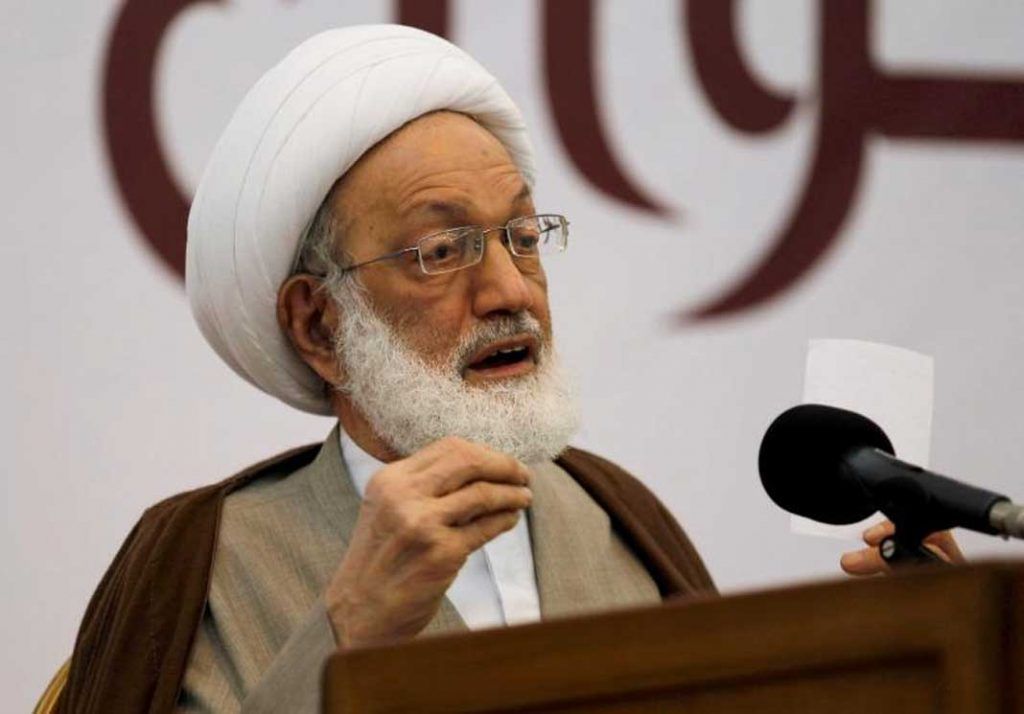May 23, 2017
By Noah Browning
DUBAI (Reuters) – Bahraini security forces on Tuesday raided the home of the kingdom’s Shi’ite Muslim spiritual leader and shot dead at least one demonstrator during the operation.
Ayatollah Isa Qassim was not among the 50 people arrested during the raid, but the move is likely to raise tensions in Bahrain days after U.S. President Donald Trump said Washington’s relationship with the Sunni-ruled kingdom – long strained over its human rights record – would improve.

“The operation in Diraz was based on intel that several fugitives connected to serious acts of terrorism and the killing of a policeman were harboured in the village,” a security official told Reuters, adding that six people were arrested from the cleric’s home.
Bahrain’s interior ministry issued a statement later saying that five people had died during the raid and 286 had been arrested.
Qassim faces expulsion from the kingdom after authorities revoked his citizenship last year for alleged links to Iran and fomenting violence, charges he has denied.
Rights activists say the revocation of Qassim’s citizenship was part of a crackdown by the Sunni-ruled kingdom on the mainly Shi’ite Muslim opposition which had been seeking a greater say in running the country.
The interior ministry said 50 people were arrested in total in the Diraz operation. Activists identified the man shot and killed by birdshot as Mohammed Zein al-Deen and said dozens more were hurt or suffered tear gas inhalation.
The operation took place two days after a Bahraini court convicted Qassim of financial corruption and sentenced him to a suspended one-year jail term, but the security source said the raid did not target the cleric.
Ebtasam Alsaegh, from the neighbouring village of Bani Jamra, said mosques were calling residents on to the streets to protect Qassim.
“The situation is terrifying. … It’s making people really angry and the young men are taking to the streets. The mosque speakers are calling out ‘God is Great’, urging people to come out and protect Sheikh Qassim,” she said by phone.
U.S. DETENTE
In 2011, Bahrain crushed an uprising by the majority Shi’ite community. The government believes the opposition seeks to overthrow it by force and says Iran has aided in deadly militant attacks on security forces.
An Iranian foreign ministry spokesman condemned the raid and said the Bahraini government “will be the responsible for all consequences.”
Iran’s Foreign Minister Mohammad Javad Zarif said the raid was a consequence of Trump’s visit to Riyadh over the weekend during which the U.S. leader singled out Tehran as a sponsor of militant groups, comments that aligned with the views of predominantly Sunni Saudi Arabia.
Zarif tweeted: “First concrete result of POTUS (Trump) cozying up to despots in Riyadh: Deadly attack on peaceful protesters by emboldened Bahrain regime.”
Bahraini MP Abdullah bin Huwail said in a statement that the security operation showed the government’s resolve to confront an Iranian-backed security threat.
“Some areas in Diraz village had transformed into a teeming sanctuary embracing terrorists, saboteurs and fugitives from justice,” said bin Huwail, the head of the parliamentary council on national foreign affairs, defence and security council.
“There is no dialogue with terrorism and terrorists, especially if the goal is to advance suzerainty on the part of the Iranian regime.”
In Riyadh, Trump said Washington’s relations with Bahrain were set to improve, after tensions with his predecessor, Barack Obama, over the kingdom’s rights record.
Bahrain denies any discrimination or systematic excessive use of force.
Human Rights Watch condemned the Diraz raid as a crackdown on free expression. It said it was no coincidence it occurred two days after a “convivial” meeting between Trump and King Hamad.

